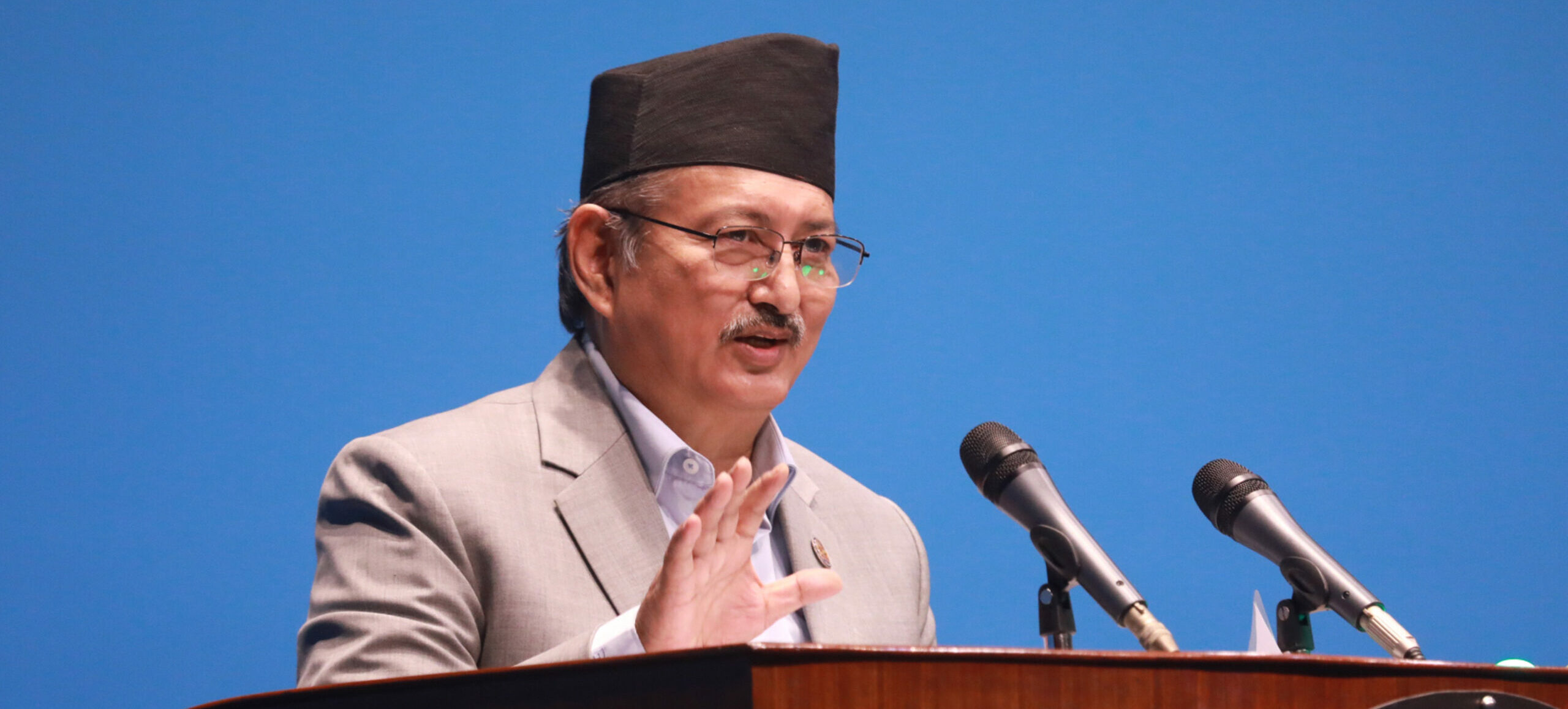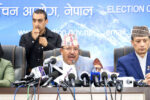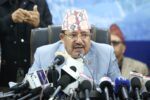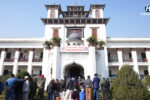KATHMANDU: Former Home Minister Bal Krishna Khand’s recent release from prison after seven months has ignited a lively debate about his prospective role in the factional politics of the Nepali Congress.
As he steps back into the political arena, the question looms large: What lies ahead for Khand and the political landscape?
Opinions vary widely, with some expressing concerns that Khand’s involvement in financial crimes might further tarnish the party’s reputation, while others delve into speculations about potential government and party dynamics.
There is even talk of Khand would play a role to remove Home Minister Narayankaji Shrestha.
Khand, a Nepali Congress leader, was arrested on charges related to orchestrating fake Bhutanese refugee schemes and their subsequent relocation to America.
Despite the controversy, Khand secured his release by posting a bond of Rs. 45 lakh to the court and the Money Laundering Department, leaving many to ponder his next moves.
In the ups and downs of Nepali Congress politics, Khand emerged as a key ally of NC President Sher Bahadur Deuba.
Allegations circulate regarding Nepali Congress lawmaker and medical businessman Sunil Sharma’s involvement in severing ties with the Maoists and forming an alliance with the UML.
However, his role as Home Minister in facilitating Deuba’s ascent to the party President position drew severe criticism within the party.
A new narrative is emerging within the Nepali Congress, suggesting that Khand may be leaning towards Dr. Shekhar Koirala due to the trust established during challenging times.
Khand, in collaboration with Koirala, has expressed admiration for the Koirala family, crediting Girija Prasad Koirala for guiding him to the leadership of the Tarun Dal.
While Deuba garnered support in Madhesh province, Khand accused him of trapping him in the fake Bhutanese refugee case, leading to strained relations.
Khand’s discontent manifested publicly through his wife, Manju Khand, who aired grievances against Deuba’s wife, Dr. Arju Rana Deuba, on social media.
Following Khan’s arrest, political figures like Gagan Thapa and Bishwa Prakash Sharma thanked Home Minister Narayankaji Shrestha for the government’s actions.
In contrast, Shekhar Koirala visited Khand in jail, extending assurances and deepening their political ties.
The underlying tension between Khand and Deuba stems from the former’s belief that Deuba did not adequately support him in the fake Bhutanese refugee case.
This discord strained the relationship between their wives, with Manju Khand alleging that Khand’s plight resulted from the party leadership’s failures.
As the Congress grapples with internal strife, the question of Khand’s future strategy remains unanswered.
Observers speculate that if the issue surrounding the fake Bhutanese refugees persists, Khand’s political standing within the party may further weaken.
Despite Deuba’s efforts to save Dr. Arzu, Khand remains a complex figure in the intricate web of Congress politics, raising uncertainties about the road ahead for Khand.
The Nepali Congress finds itself embedded in a coalition government, but not without internal frictions.
Former Home Minister Khand laments the lack of support despite holding a position of power during his tenure.
NC Vice President Purna Bahadur Khadka and Khand share a similar discontent with Finance Minister Dr. Prakash Sharan Mahat.
Consequently, Khand is inching closer to Shekhar, eyeing a pivotal role in orchestrating a government change at any cost.
Reports suggest that around 10 leaders from the party’s work execution committee align with Khand’s perspective.
This growing support fuels speculation that Khan could exert pressure to instigate a change in the Home Minister position. Some leaders argue that Khan’s alliance with Shekhar might introduce a significant shift in Congress politics.
However, Nepali Congress Lumbini Province President Amarsingh Pun urges the party to avoid entanglements in factions and sub-factions when collaborating with other parties.
He emphasizes that regardless of the allegations, the party will take appropriate action, underscoring the party’s responsibility to identify those responsible.
Pun dismisses Khand’s insistence on party unity as an illusion, suggesting that Khan’s affiliations may be more fluid than they appear.
The impact of factionalism within the Nepali Congress extends to the formation of the Koshi Province government.
After Uddhav Thapa was twice dissolved as Chief Minister, Kedar Karki assumed the role following Clause 5 of Article 168 of the Constitution.
Karki, with the support of CPN-UML, garnered 47 votes, including 39 from UML and 8 from the Shekhar Koirala faction of Nepali Congress.
This move disrupted the coalition balance at the center.
UML Chairman KP Oli, during the Mahakali Mechi Campaign, expressed dissatisfaction, stating that the ruling party leader’s release and the opposition leader’s detention reflect a biased scenario.
Allegations circulate regarding Nepali Congress lawmaker and medical businessman Sunil Sharma’s involvement in severing ties with the Maoists and forming an alliance with the UML.
Sharma’s covert meetings with KP Oli and efforts to form an alternative government have become an ‘open secret,’ following his arrest and release on charges of fake certificates.
The unexpected turn of events in the Koshi province strengthens the Shekhar faction’s bargaining power in national politics.
Uddhav Thapa, leader of the Congress Parliamentary Party in the Koshi Pradesh Assembly, acknowledges withdrawing due to a court ruling on the unconstitutionality of Koshi Province.
He asserts that Karki’s appointment as Chief Minister aligns with the advice provided by the center’s coalition, signaling a cohesive alliance with UML.
Amidst these developments, Congress MP Sharma intensifies the call for an alternative government in recent group meetings, emphasizing the need for immediate action.
The unfolding political landscape reflects the intricate interplay of alliances and power dynamics within the Nepali Congress.
In a stark contrast, the court has ordered the detention of CPN-UML leader Top Bahadur Rayamajhi, former secretary Teknarayan Pandey, Sanu Bhandari, Keshav Dulal, Indrajit Rai, Sagar Rai, Govind Kumar Chaudhary, Sandesh Sharma, and Angtawa Sherpa, while the leader of the ruling party walks free.
A case involving 20 individuals arrested for their alleged involvement in a fake Bhutanese refugee scheme, charged with fraud, forgery, crimes against the state, and organized crime, was registered in the Kathmandu District Court.
The court sent 17 people to jail and sought bail for three individuals.
The Public Prosecutor’s Office listed 30 defendants. However, the concern arises as the leader of the ruling party is released, while the leader of the opposition faces imprisonment.
Karki notes that despite attempts to cleanse Khand’s image within the Congress, the public perception of his involvement in financial crimes may linger, diminishing his influence.
UML Chairman KP Oli, during the Mahakali Mechi Campaign, expressed dissatisfaction, stating that the ruling party leader’s release and the opposition leader’s detention reflect a biased scenario.
Oli emphasized that if a person is affiliated with the Nepali Congress, they are treated differently, leading to dismissal, while UML members face heightened scrutiny.
NC Lumbini State President Pun offers a different perspective, asserting that influential leaders like Khan have suffered under the coalition government.
He contends, “A leader with a good image was apprehended after protecting a prominent figure.”
Pun adds, “Khand is not proven guilty; even the court has not established guilt. The allegations were made. What UML Chairman Oli stated is entirely incorrect. Any court decision should be accepted.”
Analysts argue that Khand’s political career may be irreversibly damaged.
Prof. Dr. Govinda Man Singh Karki asserts that Khand’s political standing is unlikely to recover.
Karki notes that despite attempts to cleanse Khand’s image within the Congress, the public perception of his involvement in financial crimes may linger, diminishing his influence.
He concludes that, historically, Nepal has seen politicians involved in financial crimes witnessing an end to their political careers.









Comment